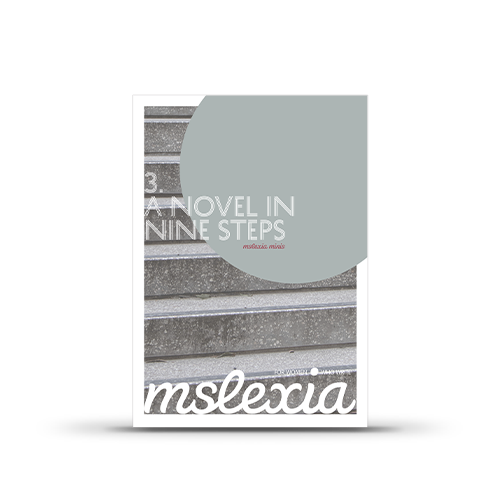
Sarah Hilary’s debut novel Someone Else's Skin was a Richard & Judy Book Club title and won the 2015 Theakston's Old Peculier Crime Novel of the Year Award. She’s written a bestseller every year since. Here’s how it all began.
I feel very lucky, of course I do. But I don’t want to stress the part played by luck in my journey to getting published. Not because I don’t believe it plays a part – it does – but because I think luck had been magnified to mythical proportions, and to the detriment of writers. If we believe too much in luck, we might neglect the hard work that’s far more vital to success.
In one sense, mine is a boring story. It doesn’t feature magical twists of fate. There are no sudden lightning flashes. I didn’t trip with my unbound manuscript and land in the arms of a dashing publisher dazzled by my brilliance. I worked hard, and I didn’t give up. I honed my native bloody-mindedness. I shed my arrogance and my illusions. I didn’t ever give up.
It happened like this.
Some time ago I set my sights on the UK’s greatest crime agent, Jane Gregory. In a piece written for Mslexia, Jane describes how tough it is to get published: new authors can spend an average of two years working on a manuscript before she deems it ready to be sent out to editors. That’s two years after Jane has decided the manuscript has potential.
At this point you might be wondering if I’m a masochist or merely an egotist. What made me think I could beat odds of 5,000 to two (5,000 being the manuscripts submitted to Jane’s agency in an average year, and two being the number of new authors she signs in the same period)?
Well, it helped that Jane encouraged me: responding to each of my submissions with a page or more of reasons why I wasn’t ready to be published, suggesting ways I could improve if I was willing to put in the time. My writing was promising, she said, but it wasn’t good enough yet.
There’s another word for these letters: rejections.
Like luck, rejection has a mythology. We invite it, but we fear it. It stops us in our tracks. But without it, how do we ever know how good our writing could be? Or whether we have the necessary staying power? I decided to see rejection as a useful part of the process. I won’t say I learnt to love rejection, but I did learn from it.
I read and re-read those letters from Jane. I printed them out and put them on the wall, circling the bits that told me how to get better. Stronger characters. Higher stakes. Tighter plotting.
When I had a fresh draft ready, I checked it against Jane’s list. Then I wrote a covering letter explaining the ways in which I’d paid attention to her advice. I was fortunate enough to have a dialogue with the agent of my choice and I made sure I respected the rules of that dialogue, by demonstrating my ability to listen, and to improve. I didn’t look for shortcuts; I didn't sulk or get defensive. I was polite and professional, and absolutely determined.
When at last I delivered a manuscript (my fourth) in which Jane had confidence, she remarked on the fact that I’d been knocking at her door for some time.
‘Yes,’ I agreed. ‘I’m famed for my stamina.’
Later in that same conversation, Jane offered to represent me. I’m fairly sure my stamina played a part in that. I know it played a bigger part than luck. Well, you only have to look at the odds.
Luck, and stamina then. What else? This next bit surprised me: I became a social creature.
D W Winnicott spoke a world of truth when he said, ‘Artists are people driven by the tension between the need to communicate and the need to hide'. The hiding was a big part of the appeal of writing for me. I liked being alone with my words. But at the same time, I wanted readers. I was impatient for them, driven by that need to communicate.
It's a myth that writers must remain apart from the world, in our lofts or sheds or on retreats. (I say this as someone with terrible shed envy.) How can we write about the world if we’re not in it? It doesn’t make sense, at least not to me. Writers need readers. Some may affect not to care what readers think of their words, but we do care. We’re not writing into a vacuum. We want to connect.
So I connected. I joined social media and wrote blog pieces about crime fiction, which served the dual purpose of reminding me what I loved about my chosen genre. I interviewed my favourite authors, like Sophie Hannah, and published the interviews on my blog. I read like a maniac and reviewed books galore for websites that specialised in crime fiction. One of my reviews ended up being used by Neil Cross, the author of the Luther books. Little by little, my name was getting out there.
I attended writing events, including CrimeFest, cadging a free weekend pass in exchange for helping market the festival. This started out as a hard slog: carrying leaflets around my home town and persuading coffee shops and bookshops to display them. I must have walked miles (but walking is good, it gets oxygen to the brain; I did some of my best writing after those long slogs around the city).
Later I had the idea of running a flash fiction contest to promote CrimeFest. I knew a bit about flash, having won the Fish Criminally Short Histories Prize, and I was in touch with writers who’d want to take part. I lay awake at night, thinking up the rules and the strap-line: ‘Bang bang you’re read'.
In case this is starting to sound like a classic case of displacement activity, I should mention that I didn’t stop wriing during this spell of social activity. In fact, I wrote more – and better – fired up after reviewing a great book (or even a bad one), chatting to a terrific writer, paying attention to what was getting published and by whom. My imagination was stimulated, and my determination got a shot in the arm each time I learnt something new, such as when a prologue works and when it doesn’t, and how prose can be breathtakingly beautiful but you still have to show a story and not tell it.
I was raised to be a superstitious child, saluting solitary magpies, tossing spilt salt across my shoulder. So the idea of luck had a special lure for me. How else do I explain my arrogance in pitching film scripts at the age of 15 to companies listed in my library copy of the Writers' and Artists' Yearbook? I wanted to believe in serendipity, in shortcuts. I didn’t want to think about the thousands and thousands of words I would need to write – in the end they totalled nearly a million – before I got anywhere near good enough to be published.
Iain Banks confirmed my experience when he said that before you write anything publishable, you have to write a million words unworthy of being published. Maybe, if you’re lucky, you can do it in a quarter of a million. But who trusts in luck?
Sarah Hilary is author of the bestselling crime series starring DI Marnie Rome. She belongs to Killer Women, a crime writing collective supporting diversity, innovation and inclusion, and helps run the St Hilda’s Crime Fiction Weekend in Oxford. Her latest novel, which came out in June 2021, is the standalone Fragile, described by her publisher as ‘Rebecca meets The Handmaid’s Tale’.
This article first appeared in Issue 63 of Mslexia.

